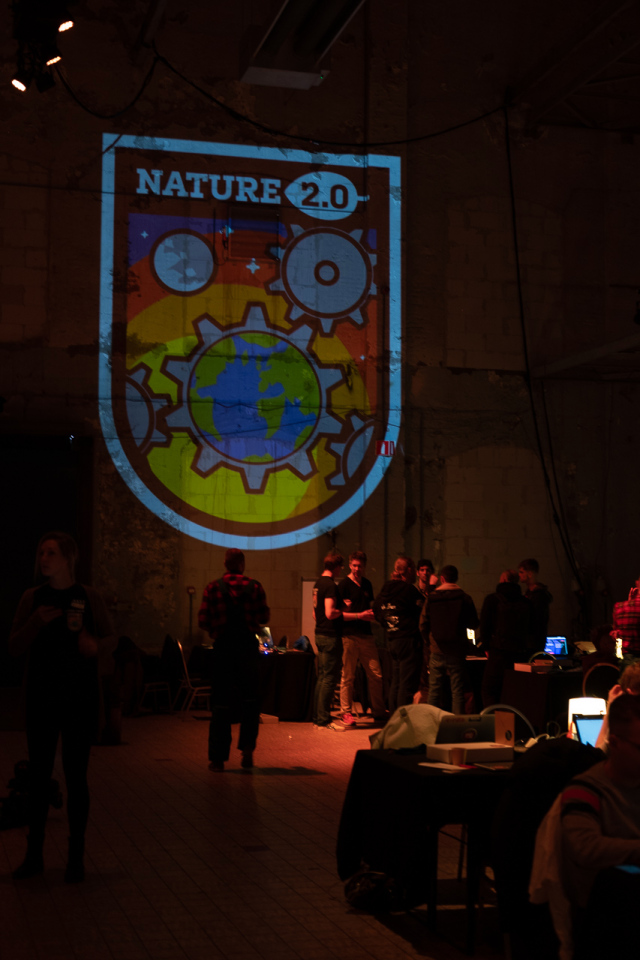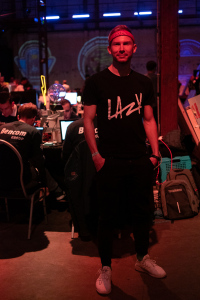The place looks like a cypherpunk’s wet dream. A darkened concrete edifice of a former sugar factory located on the outskirts of the Dutch city of Groningen gives a dramatic depth of field to the fluorescent lighting streaming across a hall the size of a football pitch. Groups of hackers huddle around dozens of tables. This is the Odyssey Hackathon, the biggest in the world.
The reason why hundreds of hackers from 29 different countries have travelled to Groningen is clear and unambiguous: Code a new reality. This is not an event about cryptocurrencies or speculative projects relating to blockchain technology. The teams exhibit almost a feverish hunger to make manifest the theoretical concepts surrounding the blockchain to develop decentralized ledger technologies that can change the world. Whether it be in the field of data privacy or using the immutability of the blockchain as a source of provenance, each team is striving to achieve something that makes a difference.
Projects that focus on digital public infrastructure and identity are in central focus. “We’re done with talking,” says Rutger van Zuidam, the event’s organizer, who carries a youthful gleam in his eye that belies the weight he has carried in helping to make Odyssey happen. “The future is not about trading. It is not CryptoKitties. It is about putting the technology to use for a better society.” The advent of the internet and the email protocol—networks of communication that are not owned by a single entity—are an inspiration for what is possible.
I travelled to Groningen a day earlier with Berchain, a team from Berlin led by Daud Zulfacar, the founder of license.rocks, a blockchain startup in the software license sector. Zulfacar, a German of Afghan and Belgium descent, has developed in collaboration with his team the concept of a social badge to give businesses and charities an actual, tracked and validated proof of the impact of their environmental work. The Berchain team hasn’t yet decided how the impact of environmental work will be validated. The deployment of satellite images of rainforests, sensors tracking biodiversity and drone images are among the data sources under consideration to achieve this aim. Berchain will compete in a track challenge for scaling solutions in wildlife protection, set by the Masarang Foundation, a non-governmental organization that supports causes that protect the environment. “The blockchain is used to show the proof and add trust,” says Daud. “People don’t trust NGOs and large companies. Our idea is to visualize [the actual work that they do].”
Related: 73 Blockchain Social Good Organizations That Are Actually Doing Something
This year’s hackathon brings together 1,500 attendees to solve 20 real societal challenges in tracks that include “fossil free future,” “nature 2.0,” “21st century digital citizenship,” “rethink retirement,” “international travel,” “crisis and disaster management,” “inclusive banking,” “feeding the future,” “scaling ecosystems,” “digital nation’s infrastructure,” and “future of cargo insurance.” The event involves the building of 100 prototypes. The winners of the 20 different tracks will each claim a €7,500 prize.
“The future is not about trading. It is not Cryptokitties. It is about putting the technology to use for a better society.”
Zulfacar leads his six-man team with an infectious enthusiasm that is loaded with a stream of comedic one-liners. Berchain team member James Farrell, a full stack developer from Dublin, is the sort of idealistic fellow that you meet at the event. He can wax lyrically on crypto. “It’s all mathematics, the language of nature. The universe is continually evolving. It is bigger than any government. We can’t win by pushing back directly, so we move sideways and do things that nobody imagined.”

When the hackathon kicks off at 12 p.m. on Friday, Daud puts brainstorming on steroids. This will carry on until the early hours of Saturday morning. It is only on the second day that the hardcore coding really kicks in. At the end the Berchain team members all look red-eyed and exhausted. The only exception is Carlos Salazar, a dark haired Venezuelan who is a full stack developer. Carlos looks as fresh faced as ever. “I’m like a gerbil in a cage. I just go round and round…”
Breaking the existing paradigm is on the mind of Griff Green, the founder of Giveth, an open source platform that aims to provide those who make donations to charity with a stake in the project that can offer the prospect of financial rewards. In this way, Giveth aims to tap into the selfish motivation that drove Bitcoin from being almost worthless to $19,000 in December 2017. Rather than the altruistic notion of giving, donators will have a vested interest in the projects they support. Griff uses the example of Curecoin, a cryptocurrency where users are able to generate CURE through the process of mining. While Curecoin is designed to help find a cure for cancer, those who speculate on the cryptocurrency can reap financial rewards.
Get the BREAKERMAG newsletter, a twice-weekly roundup of blockchain business and culture.
Clad in a beanie and bright orange workingman’s vest, Griff is overseeing five teams competing in different tracks. When you meet Griff he prefers a hug to a handshake. He points out that while our capitalist system satisfies individuals’ needs very well—giving an example of the wide choice of restaurants available to him in Los Angeles—Griff says that there are “gaps in the system” for satisfying more nebulous needs, such as a desire to protect the environment. “We call these gaps externalities,” he says. Griff describes a failure to effectively tackle issues such as homelessness and the deforestation of the rainforest as a “tragedy of the commons”. “What Giveth hopes to do is really encourage blockchain innovators to start building new systems that actually can account for value in the economic system,” he says.
When the winners are announced Berchain emerge victorious, demonstrating the strength of the Berlin blockchain ecosystem with the German capital claiming an array of track victories. Notably, Berlin-based Team GoodChain, wins the feeding the future track, with an offering that it says will enable brands in the food and beverage sector to combine being successful in business with having a social impact. Berlin-based A Solid Web is victorious in the digital nation’s infrastructure track with an offering that enables users to make more informed decisions by giving them detailed insights and full control over their permissions. Instead of trying to make sense of the terms and conditions of online agreements, consumers will be able to obtain a more intelligible explanation of the risks and consequences of giving consent. “We will also allow you to have an overview of all your permissions on the web and revoke them at any time,” says Ludwig Faust Schubert, a software engineering student.
Griff will summon his Giveth teams for a meeting in the pressroom in the immediate aftermath of the event. It’s as if the grueling hackathon never happened. The talk is of targets and driving the Giveth mission forward. Whether the evolution of the blockchain will remain in the hands of the technology’s early idealists or fall under the control of big business and government remains to be seen. Ben Goertzel, the founder and CEO of SingularityNET, a blockchain-based AI marketplace, travelled from Hong Kong to participate as an Odyssey judge. “The big question over the next five years is will Ethereum and others true to decentralization be able to get widespread adoption beyond the geeks and techno-heads, or will Wall Street come in and take over,” he says.
Photos by Alexander Haase